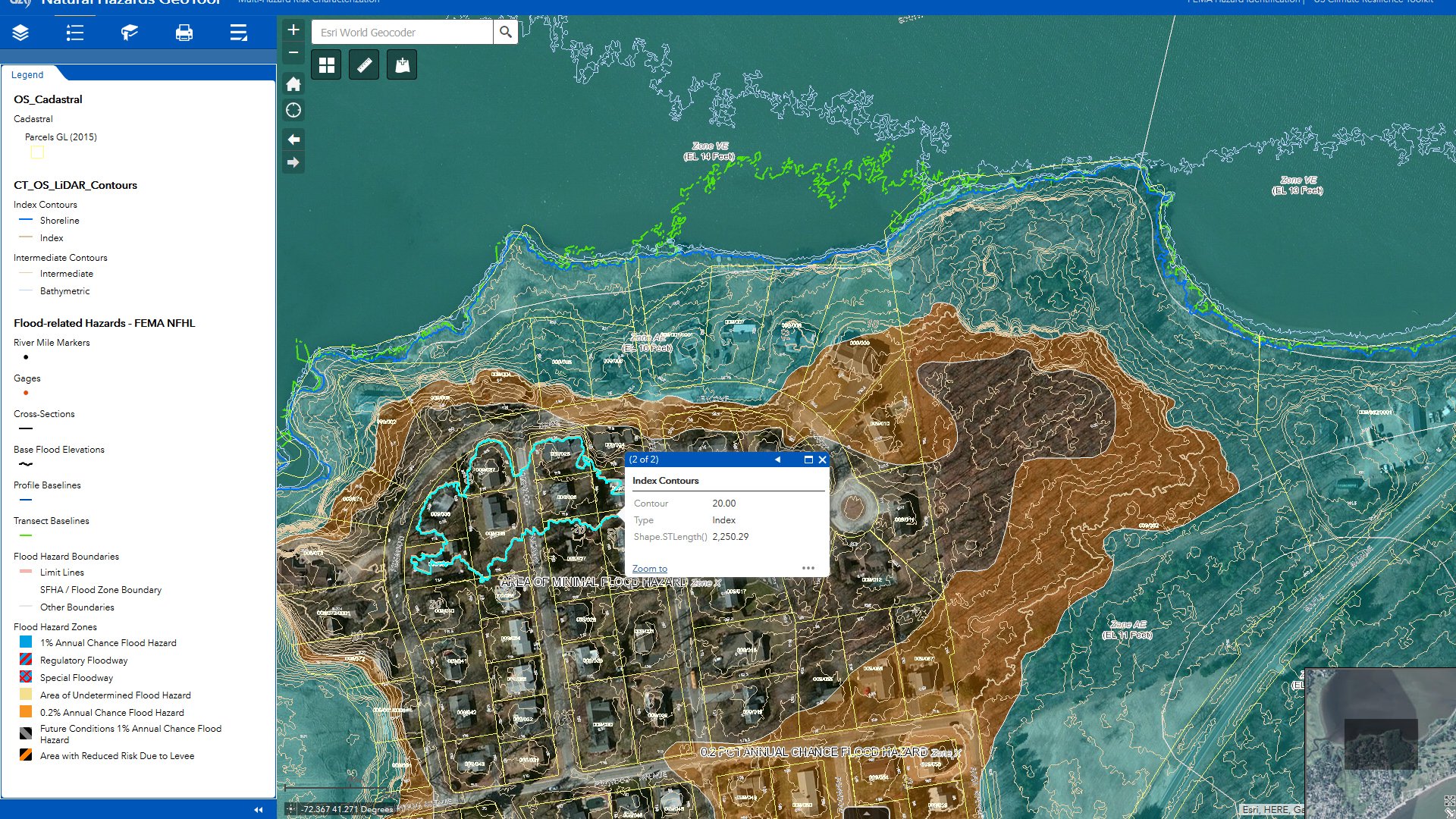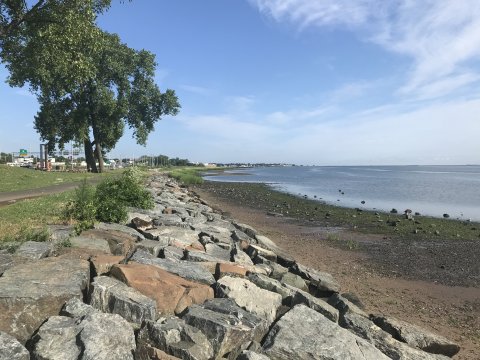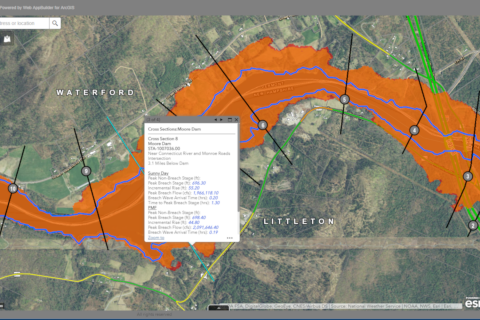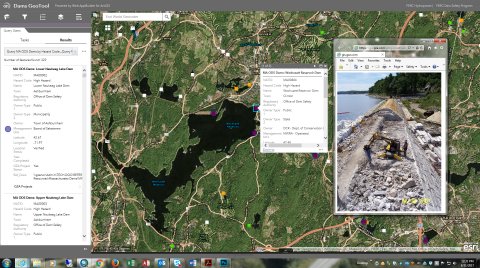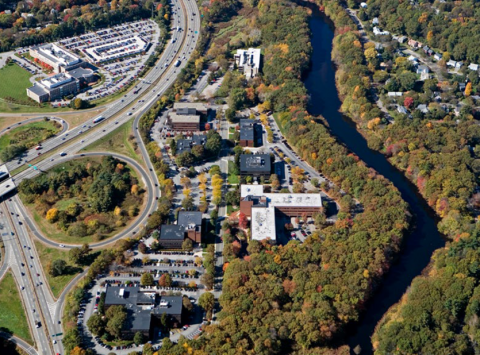GZA completed an estimated total of 10,000 hours over three years re-characterizing the flood hazards at 23 U.S. nuclear power plants in response to the devastating earthquake and tsunami in Fukushima, Japan. GZA assessed the flood hazards of most of the major rivers, watersheds and coastal flood zones in the country, and we helped determine which power plants could continue to safely operate with flood mitigation and contingency measures approved by the US Nuclear Regulatory Commission.
GZA complements our core engineering, environmental and applied science services with a dedicated team of planners, scientists and engineers specializing in the practice areas of natural hazard risk management, climate and disaster risk assessment, risk management strategies, and climate change adaptation.
We apply a balanced and holistic approach that includes systems thinking, risk-informed decision making, social equity and benefit-cost analysis. We integrate sustainable and resilient solutions into your projects from planning, funding and stakeholder engagement through geospatial mapping, permitting, design, and construction management. Clients and their stakeholders rely on GZA for conducting vulnerability assessments, risk analyses and emergency response plans. We help you plan, fund and design for sustainability and resilience at Essential Services, Lifeline Facilities, High Loss Potential Facilities, commercial, institutional and industrial buildings and transportation infrastructure. We also provide natural hazard mitigation and climate adaptation planning for municipalities.
GZA assists state and local governments throughout the natural hazard risk management and emergency management cycle of preparedness, response, recovery and redevelopment. Natural Hazard Mitigation Plans are the first step in the process.
GZA’s Natural Hazard Mitigation Plans meet FEMA’s plan requirements and are also designed to be actionable and are integrated with dedicated user-focused web-mapping applications.
- Hazard Identification
- Hazard Vulnerability Assessment
- Climate Change Forecasting
- Climate and Disaster Risk Assessment
- Loss Estimation, including FEMA HAZUS-MH analyses
- Mitigation Strategies and Actions
- Hazard Communication and Stakeholder Outreach
- Mitigation and Resilience Feature Design and Construction
- Plan Reviews and Adoption
- Metocean Data Analysis
- Geospatial Information Management and Web Development
Coastal communities are increasingly vulnerable to the effects of coastal flooding, climate change and sea level rise. This vulnerability can affect the social, environmental and economic sustainability of the community.
GZA provides comprehensive coastal resilience and climate change adaptation planning and design services to assess and mitigate those risks.
- Coastal Flood Hazard Vulnerability Assessment
- Natural Hazard Mitigation Plans
- Coastal Resilience and Climate Adaptation Plans
- Emergency Response Plans
- Resilience Feature Design Including Seawalls, Floodwalls and Natural & Nature-Based Features including Living Shorelines
- Stormwater Infrastructure Engineering and Design
- Plan Implementation Consulting and Training
- Financial and Cost Recovery Planning
- Grant Application Preparation
- Geospatial Information Management and Web Development
Emergency Response Plans define the specific actions to be implemented in anticipation of, and in response to, the occurrence of natural disasters.
GZA develops action-oriented plans that include step-by-step approaches to protect people and conserve property. GZA’s plans are based on real-time data and multiple natural hazard scenarios.
- Hazard Identification
- Risk Assessment
- Development of Performance Objectives
- Protective Actions for Life Safety
- Hazardous Materials Management
- Health and Safety Training
- Emergency Response Training
- Hazard Warning, Notification and Communication
Recovering from natural disasters can be a challenging and time-consuming process.
GZA assists public and private clients with disaster recovery support ranging from disaster recovery plans to FEMA Public Assistance grant applications to repair and improve public infrastructure.
- Public Assistance Grant Application Technical Assistance
- Project Worksheets Technical Assistance
- Regulatory Compliance
- FEMA Benefit-Cost Analysis (BCAs)
- Damage Assessments
- Cost Estimation
FEMA Flood Insurance Rate Maps provide the basis for establishing national flood insurance rates.
GZA assists communities with the re-evaluation of Preliminary and Effective FEMA Flood Insurance Rate Maps and the revision or amendment of a community’s effective flood map, where warranted, through non-FEMA initiated revision processes. GZA also assists property owners with localized map revision.
- Flood Hazard Characterization Consistent with FEMA Guidance
- Community-Initiated Revision under Part 65 of the NFIP Regulations
- Community-Initiated Revision through the Cooperating Technical Partner (CTP) Initiative
- FEMA Physical Map Revisions (PMR)
- FEMA Letter of Map Revision (LOMR)
- FEMA Letter of Map Amendment (LOMA)
- FEMA Levee Accreditation Evaluation and Certification
- Community Rating System (CRS)
The increasing risks due to natural hazards and climate change are threatening property asset operations and value.
As part of GZA’s property services, we work with property owners and asset managers to assess asset vulnerability to natural disasters and implement climate change adaptation and risk management strategies.
- Multi-Hazard Vulnerability Assessment
- Regulatory Code Compliance Review
- Risk Analysis
- Risk Management Strategies
- Benefit-Cost Analysis
- FEMA-Related Services
- Permitting
- Hazard Mitigation Design and Construction
- Insurance Support
- Emergency Response Plans
- Disaster Recovery
Incorporating resilience and climate adaptation into site and structure design can reduce future losses and property devaluation and maintain or improve future property value.
GZA works with property owners, architects and designers to design and construct sites that are regulatory-compliant, mitigate the effects of flooding and other natural hazards, and support future climate change adaptation.
- Multi-Hazard Assessment
- Regulatory Compliance and Permitting
- Benefit-Cost Analysis
- Site Design
- Landscape Architecture
- Stormwater Management, including Green Infrastructure
- FEMA-Related Services
- LEED Certification, including Resilient Design
Creating and maintaining reliable and resilient infrastructure reduces the likelihood of damage, disruption of service, economic loss, and loss of life. Incorporation of climate change factors into infrastructure design and construction creates resilience, longevity, and economic value.
We have assessed the natural hazard vulnerability of some of the most critical infrastructure in the United States, and have provided specialized expertise in natural hazard assessment and mitigation for transportation, High Loss Potential Facilities and lifeline systems, including multi-hazard assessment; environmental conditions analysis and design input; hazard vulnerability and life performance assessment, mitigation planning and design and Risk-Informed Decision Making.
- Power Generation and Transmission
- Transportation
- Water and Wastewater Facilities
- High Hazard Dams
- Communications Systems
Climate change and carbon management are creating challenges to communities and business.
As part of GZA’s sustainability services, GZA provides planning and technical expertise for carbon management and climate adaptation.
- Sustainability
City of Northampton Climate Resiliency and Regeneration Plan
Flood Hardening Program, Confidential Utility
Long Wharf Flood Protection Study and Living Shoreline Design
Blog
An Introduction to GZA's Environmental Planning & Land Use Practice
GZA’s Land Use and Environmental Planning practice is a multidisciplinary group dedicated to analyzing and organizing the physical, economic, and social development of places, towns, cities, and...
Blog
Southeast Michigan Resilience Fund Announces 2026-2026 Grant Cycle Opening
The Southeast Michigan Resilience Fund has announced the launch of its 2025-2026 grant cycle. This fund, administered by the National Fish and Wildlife Foundation (NFWF), aims to enhance the...
Article
Accelerating climate change demands ‘agile systems’ thinking — and action
In an opinion piece for Commonwealth Beacon, Curt Spalding talks about the need for most agile environmental management to address the likely impacts of accelerating climate change. As Spalding notes...
Blog
Modernizing Probable Maximum Precipitation Estimates: Anticipating New Challenges in Infrastructure Safety
For many decades, critical structures like dams and nuclear power plants in the United States have been designed to withstand extreme weather events using Probable Maximum Precipitation (PMP)...
Tell us about your project.

